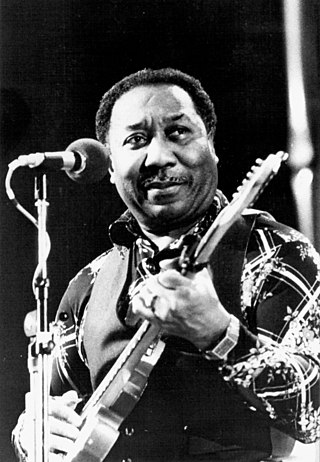
McKinley Morganfield, known professionally as Muddy Waters, was an American blues singer and musician who was an important figure in the post-World War II blues scene, and is often cited as the "father of modern Chicago blues". His style of playing has been described as "raining down Delta beatitude".
Hollywood usually refers to:

The Moody Blues were an English rock band formed in Birmingham in May 1964. The band initially consisted of drummer Graeme Edge, guitarist/vocalist Denny Laine, keyboardist/vocalist Mike Pinder, multi-instrumentalist/vocalist Ray Thomas, and bassist/vocalist Clint Warwick. Originally part of the British beat and R&B scene of the early–mid 1960s, the band came to prominence with the UK No. 1 and US Top 10 single "Go Now" in late 1964/early 1965. Laine and Warwick left the band by the end of 1966, being replaced by guitarist/vocalist Justin Hayward and bassist/vocalist John Lodge. They embraced the psychedelic rock movement of the late 1960s, with their second album, 1967's Days of Future Passed, being a fusion of rock with classical music that established the band as pioneers in the development of art rock and progressive rock. It has been described as a "landmark" and "one of the first successful concept albums".
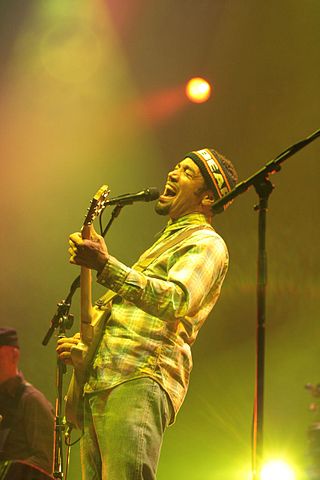
Benjamin Charles Harper is an American singer-songwriter and multi-instrumentalist. Harper plays an eclectic mix of blues, folk, soul, reggae, and rock music and is known for his guitar-playing skills, vocals, live performances, and activism. He has released twelve studio albums, mostly through Virgin Records, and has toured internationally.

The White Stripes were an American rock duo from Detroit, formed in 1997. The group consisted of Jack White and Meg White. They were a leading group of the 2000s indie rock and garage rock revival.

Robert William Gary Moore was a Northern Irish musician. Over the course of his career he played in various groups and performed a range of music including blues, blues rock, hard rock, heavy metal, and jazz fusion.

Henry St. Claire Fredericks Jr., better known by his stage name Taj Mahal, is an American blues musician. He plays the guitar, piano, banjo, harmonica, and many other instruments, often incorporating elements of world music into his work. Mahal has done much to reshape the definition and scope of blues music over the course of his more than 50-year career by fusing it with nontraditional forms, including sounds from the Caribbean, Africa, India, Hawaii, and the South Pacific.

George "Buddy" Guy is an American blues guitarist and singer. He is an exponent of Chicago blues who has influenced generations of guitarists including Eric Clapton, Jimi Hendrix, Jimmy Page, Keith Richards, Stevie Ray Vaughan, Jeff Beck, Gary Clark Jr. and John Mayer. In the 1960s, Guy played with Muddy Waters as a session guitarist at Chess Records and began a musical partnership with blues harp virtuoso Junior Wells.

Kevin Roosevelt Moore, known as Keb' Mo', is an American blues musician and eight-time Grammy Award winner. He is a singer, guitarist, and songwriter, living in Nashville, Tennessee. He has been described as "a living link to the seminal Delta blues that travelled up the Mississippi River and across the expanse of America." His post-modern blues style is influenced by many eras and genres, including folk, rock, jazz, pop and country. The moniker "Keb Mo" was coined by his original drummer, Quentin Dennard, and picked up by his record label as a "street talk" abbreviation of his given name.

Laura Ann Branigan was an American singer-songwriter and actress. Her signature song, the platinum-certified 1982 single "Gloria", stayed on the U.S. Billboard Hot 100 for 36 weeks, then a record for a female artist, peaking at No. 2. It also reached number one in Australia and Canada. Branigan's "Gloria" was a cover of a song written by Italian singer-songwriters Giancarlo Bigazzi and Umberto Tozzi. In 1984, she reached number one in Canada and Germany with the U.S. No. 4 hit "Self Control", which was released by Italian singer and songwriter Raf the same year. Both "Gloria" and "Self Control" were successful in the United Kingdom, making the Top 10 in the UK Singles Chart.
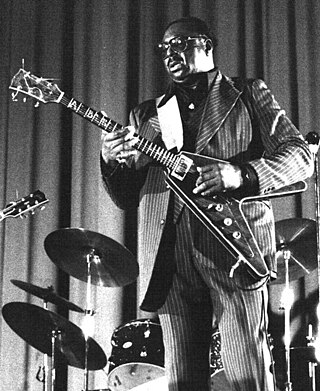
Albert Nelson, known by his stage name Albert King, was an American guitarist and singer who is often regarded as one of the greatest and most influential blues guitarists of all time. He is perhaps best known for his popular and influential album Born Under a Bad Sign (1967) and its title track. He, B.B. King, and Freddie King, all unrelated, were known as the "Kings of the Blues". The left-handed Albert King was known for his "deep, dramatic sound that was widely imitated by both blues and rock guitarists."
The blues is a vocal and instrumental form of music based on the use of the blue notes and a repetitive pattern. The word is also often used in musical contexts to refer to the twelve-bar blues, a particular blues song form, or talking blues, a form of country music.

Joseph Leonard Bonamassa is an American blues rock guitarist, singer and songwriter. He started his career at age twelve, when he opened for B.B. King. Since 2000, Bonamassa has released fifteen solo albums through his independent record label J&R Adventures, of which eleven have reached No. 1 on the Billboard Blues chart.

Harry Manx is a Canadian musician who blends blues, folk music, and Hindustani classical music. His official website describes his music as being a "blend Indian folk melodies with slide guitar blues, add a sprinkle of gospel and some compelling grooves and you'll get Manx's unique "mysticssippi" flavour." Manx plays the slide guitar, harmonica, six-string banjo, mohan veena and Ellis stomp box. He studied for five years in India with Vishwa Mohan Bhatt. Bhatt is the inventor of the 20-stringed mohan veena, which has become Manx's signature instrument. He has released twelve albums in twelve years, and has his own record label Dog My Cats Records. He has received much recognition and many awards, including: seven Maple Blues Awards, six Juno nominations, the Canadian Folk Music Award in 2005 for Best Solo Artist, and CBC Radio’s "Great Canadian Blues Award" in 2007.
"Cocaine Blues" is a Western swing song written by Troy Junius Arnall, a reworking of the traditional song "Little Sadie." Roy Hogsed recorded a well known version of the song in 1947.
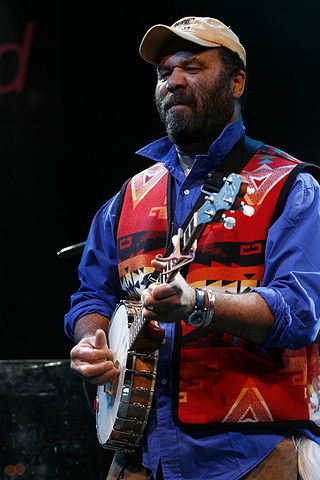
Otis Taylor is an American blues musician. He is a multi-instrumentalist whose talents include the guitar, banjo, mandolin, harmonica, and vocals. In 2001, he was awarded a fellowship to the Sundance Film Composers Laboratory.

"Tuesday Afternoon" is a 1968 song written by Justin Hayward that was first released by English rock band the Moody Blues on their 1967 album Days of Future Passed and later released as a single.
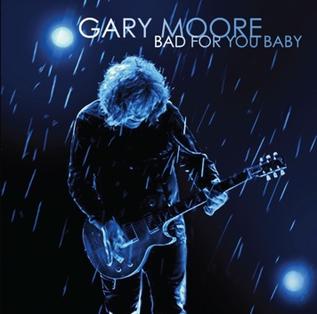
Bad for You Baby is the seventeenth solo album by Northern Irish blues guitarist and singer-songwriter Gary Moore, the last album to be released in his lifetime, and the last album until 2021's How Blue Can You Get.
Ballads and Blues may refer to:














